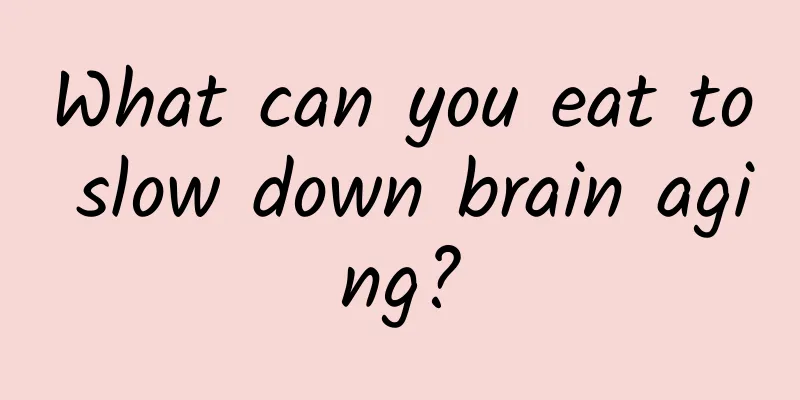What can you eat to slow down brain aging?

|
September is not only the start of the school year, but also Brain Health Month in our country. September 16 is Brain Health Day. As we age, our brain power declines to some extent. A poem that you can memorize at the age of 21 may be forgotten at the age of 41. You can handle several things at the same time at the age of 24, but you may have lost this ability at the age of 54 and can only do them one by one. At the age of 35, you are still enthusiastic about new appliances and new software, but at the age of 65, you are helpless with new apps and cannot learn them no matter what... These are all manifestations of cognitive degeneration. But the rate at which cognitive abilities decline seems to vary widely from person to person, with some people still able to think clearly into their 80s, while others become mentally retarded in their 50s and already developing dementia by their 60s. The brain's functions require very high nutritional support, and dietary nutrition is very important for cognitive ability. ——The brain and nervous system contain a high proportion of lipids , including cholesterol and DHA. Lack of essential fatty acids and omega-3 fatty acids will affect the function of the nervous system; ——Brain activity requires a lot of neurotransmitters as mediators, and most neurotransmitters are converted from amino acids in proteins; - The synthesis and conversion of neurotransmitters requires the help of a variety of B vitamins . Lack of them may lead to emotional and thinking disorders such as frustration, depression, dullness, and dementia. ——The brain is very sensitive to inflammation and oxidation and needs the support of vitamin E and antioxidants from various plants; ——The high-speed operation of the brain consumes a lot of oxygen, so it needs a smooth and efficient blood circulation system , and a blood pressure that is neither too high nor too low to ensure the efficiency of brain blood supply; ——Brain activity consumes glucose, and a stable blood sugar level is essential for brain power, so it requires the body to have good insulin sensitivity, which can efficiently accept glucose in the blood into cells and fully oxidize it into energy; - Vitamin B12 is needed to maintain the outer layer of nerve tissue called the nerve sheath. Lack of this vitamin can lead to cognitive impairment and even dementia. ——The intestinal flora participates in the functional adjustment of the brain through the brain-gut axis, while the dietary fiber and various nutrients in food prevent brain inflammation by improving the balance of intestinal microecology; However, some nutritional intervention studies have found that Simply providing middle-aged and elderly people with some nutrients that are known to be beneficial to the brain's nervous system, such as vitamin E, DHA, antioxidants, etc., for a long time does not seem to have such a significant effect on preventing brain aging. However, observational studies have found that changing the overall dietary pattern is helpful. Healthy dietary patterns such as the Mediterranean diet and the DASH diet are beneficial for delaying cognitive decline . Some researchers combined these two dietary patterns, incorporating various food factors known to be beneficial to the health of the brain's nervous system, and summarized them into a "MIND dietary pattern", and found that it can protect the cognitive ability of the elderly and help prevent Alzheimer's disease and other dementias. The Mediterranean diet is well known. It focuses on eating a variety of foods, including enough fruits and vegetables, fish and whole grains, with less red meat and dairy, seasoning with a variety of natural spices, and cooking with olive oil . Many people only remember to drink a small amount of wine, but they don't know that the part other than wine is the true meaning of its health. The DASH diet is a dietary plan designed for controlling high blood pressure. It focuses on various dietary factors that are beneficial to lowering blood pressure, encourages eating more vegetables, fruits, beans and low-fat dairy products, replaces refined staple foods with whole grains, requires eating less red meat and replacing it with fish, chicken and duck, cooking with vegetable oil, and limiting salt intake . So, what exactly does the MIND dietary pattern, which combines the best of both, involve? This dietary pattern emphasizes: You need to take in three core foods: green leafy vegetables, fish and whole grains. In addition, you need to take in nuts and oilseeds regularly, eat fruits appropriately, replace red meat with poultry, replace butter with olive oil, and strictly limit fried foods, fast food, high-salt foods, sweets and drinks, etc. It does not limit eating one egg a day, nor does it prohibit the consumption of dairy products. This diet includes almost all factors that are beneficial to brain health, while eliminating as many factors that are detrimental to brain health as possible. For example, fried foods not only contain high levels of saturated fat, but also contain pro-inflammatory substances and trace amounts of trans fatty acids produced during the frying and heating process, which can damage blood vessels. Some studies have also found that long-term heating of frying oil is associated with higher blood pressure and is not good for intestinal health. Sweets and sweet drinks not only have low nutritional value, but also consume B vitamins, promote obesity, and reduce insulin sensitivity. Excessive sugar can also promote the saccharification of proteins in the body and produce aging substances. These are not conducive to delaying brain aging. High-salt foods and some highly processed foods contain too much sodium, which contributes to high blood pressure. High blood pressure is an important factor in damaging blood vessels and promoting Alzheimer's disease. Red meats such as beef, mutton and pork contain too much heme iron. Although eating in moderation is helpful in preventing anemia, eating too much may cause excessive oxidative stress in the body, and brain tissue is particularly afraid of oxidation. Fresh vegetable oils are rich in vitamin E and essential fatty acids , which are beneficial to brain function. However, this does not mean that you must eat olive oil. Soybean oil, rapeseed oil, etc. are also beneficial, and even more advantageous. For example, the omega-3 and omega-6 essential fatty acid content of soybean oil is much higher than that of olive oil, and it also contains more vitamin E; low-erucic acid rapeseed oil not only has an oleic acid content comparable to olive oil, but also has a higher content of vitamin E and omega-3 essential fatty acids than olive oil. Appropriate fish intake helps provide omega-3 fatty acids such as DHA and EPA. Eating fish two or three times a week is a good dietary habit. The cholesterol content in brain tissue is particularly high, so there is no need to worry about the cholesterol in moderate amounts of fish, shrimp and one egg yolk. Replacing some refined staple foods with whole grains is not only beneficial for controlling blood sugar, but also provides more B vitamins, vitamin E, potassium and dietary fiber, which are beneficial to intestinal health, blood pressure health and brain health. Nut oil seeds are good for improving blood lipids and can provide a lot of vitamin E, as well as B vitamins, potassium, magnesium and dietary fiber. Walnuts are not the only nuts that can improve brain health, but walnuts are indeed the most antioxidant and have the best ratio of essential fatty acids among nuts, so they are worth eating regularly. Fruits provide a variety of antioxidants and potassium. Berries, in particular, are considered particularly beneficial for improving cognitive function, probably because they are high in anthocyanins, which are strong in antioxidants, and are rich in dietary fiber. Finally, we would like to introduce green leafy vegetables , those dark green leafy vegetables. Epidemiological studies have found that dark green leafy vegetables may have a good effect on delaying cognitive decline in the elderly. Compared with other vegetables, green leafy vegetables are particularly rich in vitamin K (chlorophyll) and folic acid, have the highest content of alpha-tocopherol among vegetables, are rich in lutein and beta-carotene, and are also the main dietary source of nitrates. In addition, they contain flavonoids such as kaempferol. Studies have found that the higher the intake of these ingredients, the less cognitive decline with age. According to data from relevant studies, eating only one serving of green leafy vegetables a day, about 100 grams of raw vegetables, can protect cognition . After cooking, it is only about half a bowl, which is not difficult to eat. Dark green leafy vegetables include Chinese cabbage, rapeseed (including various sizes), rapeseed stalks (including cauliflower), kale, mustard greens, tatsoi, amaranth, spinach, fennel, chrysanthemum, watercress, coriander, shallots, leeks, green garlic, asparagus, lettuce, green lettuce (not light-colored head lettuce), etc. It also includes those dark green tender stems and tender florets, such as asparagus and broccoli. Although the price of green leafy vegetables has continued to rise in recent years, China is still the easiest place to eat enough green leafy vegetables. In my country, the output of green leafy vegetables is huge, they are available all year round, and the price is lower than the world average. Friends who are worried about their brain deterioration may wish to check their diet according to the above dietary requirements that are beneficial to cognitive health to see if there are any areas that need improvement? Of course, in addition to eating three good meals a day, you should also pay attention to getting enough sleep (lack of sleep seriously damages cognitive function), exercising moderately (lack of exercise affects blood supply to the brain), actively accepting and participating in new things, thinking often, and avoiding "use it or lose it". Reprint/ Cooperation please contact Weibo/ Official Account: Fan Zhihong_Original Nutrition Information Toutiao contracted author Post-scientist at Beijing Food Nutrition and Human Health Advanced Innovation Center Director of Beijing Nutritionist Association Director of China Health Promotion and Health Education Association China Association for Science and Technology appoints chief expert on nutrition science communication PhD in Food Science, China Agricultural University |
<<: A scientific guide to petting cats (full version)
Recommend
Can retention rate be calculated this way?
The concept of retention rate is not unfamiliar to...
Product application fragmentation increases the difficulty of color TV Internetization
Smart TV products have become a rising star in th...
APP promotion: digging into those niche promotion channels (there is always one that suits you)
There are many articles about App promotion chann...
Comprehensive and easy to understand! A guide to information architecture design for beginners
Many product designers are obsessed with the use ...
Why do humans have hair?
I believe you have already discovered that humans...
Download the full set of "Uncle Kai's Sound and Rhythm Enlightenment" audio and listen online to Baidu Netdisk sharing address
Download the full set of "Uncle Kai's So...
Tourist's hair suddenly stood up, netizens reminded: Get out of here! Experts said: Don't run around!
Recently, in Turpan, Xinjiang Tourists' hair ...
WeChat's new internal beta feature exposed: "two-way deletion of friends"
Recently, WeChat version 6.6.2 was officially lau...
Advertising account optimization methods for the business service industry!
How to optimize accounts in stages to achieve the...
APP advertising: How to choose the right delivery channel?
If you don’t advertise, you’re waiting for death;...
2019 APP download rankings released: Douyin ranks second with over 700 million downloads
Recently, the data statistics company Sensor Towe...
Marketing promotion: How far are "HEYTEA" from Starbucks?
At the beginning of the year, Ma Dong accepted an...
Wall Street Academy "Analysis of the Key Points of Investment Research and Analysis Practice" Investment Research and Analysis Practical Skills [MP4/PDF/1.17GB]
"Wall Street Academy's "Analysis of...
There are three basic routines for content creation. If you understand them, you can avoid taking 10 years of detours!
There was no trap in the world, but when more peo...
Don’t want to drink milk? Try these “milk substitutes” →
For most people of this generation, the main sour...









